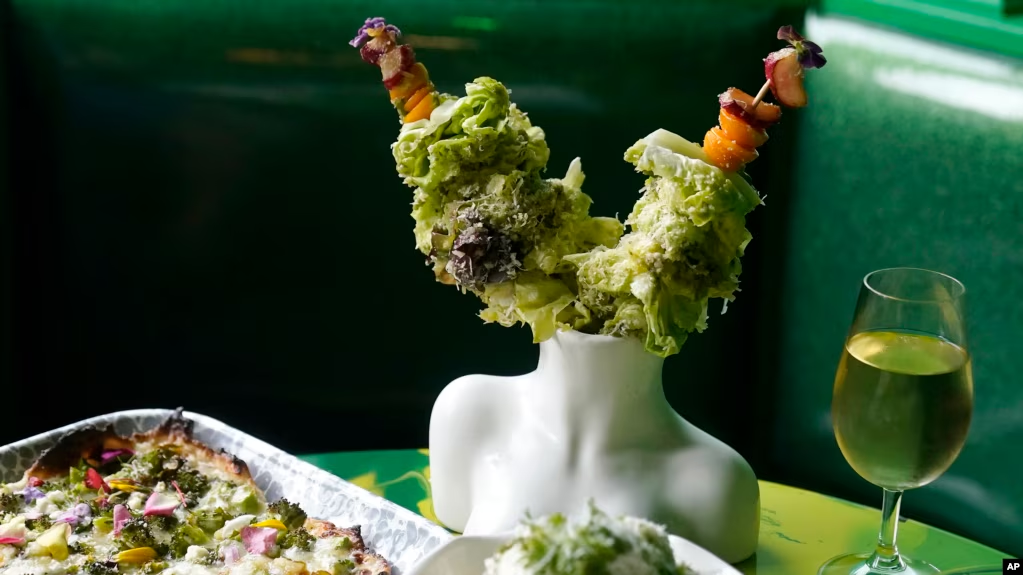US Restaurants, Companies ‘Upcycle’ Leftover Food
US Restaurants, Companies ‘Upcycle’ Leftover Food
今回は、見た目や色の理由でこれまで捨てられてきた野菜や果物が、新たな商品として生まれ変わる取り組みの話題です。アメリカではこうした「アップサイクル食品」が広がり、アイスやピザなどにも活用されるようになっています。記事には discolored(変色した)という単語が登場します。これは dis(否定・反対)+ colored(色がついた)で構成されており、discolored leaves(変色した葉)や discolored fruit(色の悪くなった果物)のように使われます。見た目は少し悪くても、味や栄養には問題がないことも多いそうです。あなたは、見た目が不揃いな食品でも積極的に選びますか?

1.Article
Directions: Read the following article aloud.
Tyler Malek is the head ice cream maker at the Portland, Oregon-based Salt & Straw.
He uses leftover yogurt to make his lemon curd ice cream. For chocolate barley milk, he mixes leftovers of rice and grains used to make beer to give it a creamy taste.
“Instead of calling this food waste, we need to call it wasted food and start decreasing how much wasting we’re doing,” Malek said.
Malek’s ice cream company is among those at the start of a movement called upcycling. It is a process of creating high-quality products from leftover food.
The movement is gaining ground as buyers want to know what is in their food, where their food comes from, and how it affects the environment.
The Upcycled Food Association said more than 31 million metric tons of food are wasted every year in the U.S. The organization estimated that waste makes up about 40 percent of the country’s food production, costing the national economy more than $200 billion.
Upcycled food is becoming increasingly common in food products like cake mixes and veggie chips at natural food stores. Others include fruits and vegetables that are rejected by restaurants and food stores because of their shape or color.
The Upcycled Food Association gives out an official “Upcycling Certified” seal to qualifying products. These seals, found on the new Salt & Straw ice cream, bring attention to buyers that this company is upcycling food.
The organization approved 30 food products in 2021 to carry the seal. But now, 450 different products have received the marker.
Angie Crone is the organization’s chief executive. She said outdated guidelines led to a lot of wasted and uneaten food. Crone added, “So this is a mark that you can see on the products wherever you go shopping, to be able to understand how that company is reducing food waste...”
The organization’s marker is also found on all products made by Renewal Mill. The Oakland, California-based company is turning leftover food products from plant-based milk into food products like flour to reduce waste at the manufacturing level.
Caroline Cotto, the company’s founder said, “And then we use that flour to make things like baking mixes and ready-to-eat cookies.” Its flour is also used in Salt & Straw’s new “Salted Caramel & Okara Cupcakes” ice cream.
The movement is not limited to recycled products found in ice cream stores, farmers' markets, or natural food stores. In San Francisco, a restaurant is now serving pizza and wine with upcycled food such as ugly mushrooms and discolored tomatoes.
I’m Gregory Stachel.
He uses leftover yogurt to make his lemon curd ice cream. For chocolate barley milk, he mixes leftovers of rice and grains used to make beer to give it a creamy taste.
“Instead of calling this food waste, we need to call it wasted food and start decreasing how much wasting we’re doing,” Malek said.
Malek’s ice cream company is among those at the start of a movement called upcycling. It is a process of creating high-quality products from leftover food.
The movement is gaining ground as buyers want to know what is in their food, where their food comes from, and how it affects the environment.
The Upcycled Food Association said more than 31 million metric tons of food are wasted every year in the U.S. The organization estimated that waste makes up about 40 percent of the country’s food production, costing the national economy more than $200 billion.
Upcycled food is becoming increasingly common in food products like cake mixes and veggie chips at natural food stores. Others include fruits and vegetables that are rejected by restaurants and food stores because of their shape or color.
The Upcycled Food Association gives out an official “Upcycling Certified” seal to qualifying products. These seals, found on the new Salt & Straw ice cream, bring attention to buyers that this company is upcycling food.
The organization approved 30 food products in 2021 to carry the seal. But now, 450 different products have received the marker.
Angie Crone is the organization’s chief executive. She said outdated guidelines led to a lot of wasted and uneaten food. Crone added, “So this is a mark that you can see on the products wherever you go shopping, to be able to understand how that company is reducing food waste...”
The organization’s marker is also found on all products made by Renewal Mill. The Oakland, California-based company is turning leftover food products from plant-based milk into food products like flour to reduce waste at the manufacturing level.
Caroline Cotto, the company’s founder said, “And then we use that flour to make things like baking mixes and ready-to-eat cookies.” Its flour is also used in Salt & Straw’s new “Salted Caramel & Okara Cupcakes” ice cream.
The movement is not limited to recycled products found in ice cream stores, farmers' markets, or natural food stores. In San Francisco, a restaurant is now serving pizza and wine with upcycled food such as ugly mushrooms and discolored tomatoes.
I’m Gregory Stachel.
Haven Daley reported this story for The Associated Press. Gregory Stachel adapted it for VOA Learning English.
Source:US Restaurants, Companies ‘Upcycle’ Leftover Food
VOA
本教材は、the U.S. Agency for Global Mediaより許諾を得て、産経ヒューマンラーニング株式会社が編集しています。
テキストの無断転載・無断使用を固く禁じます 。
